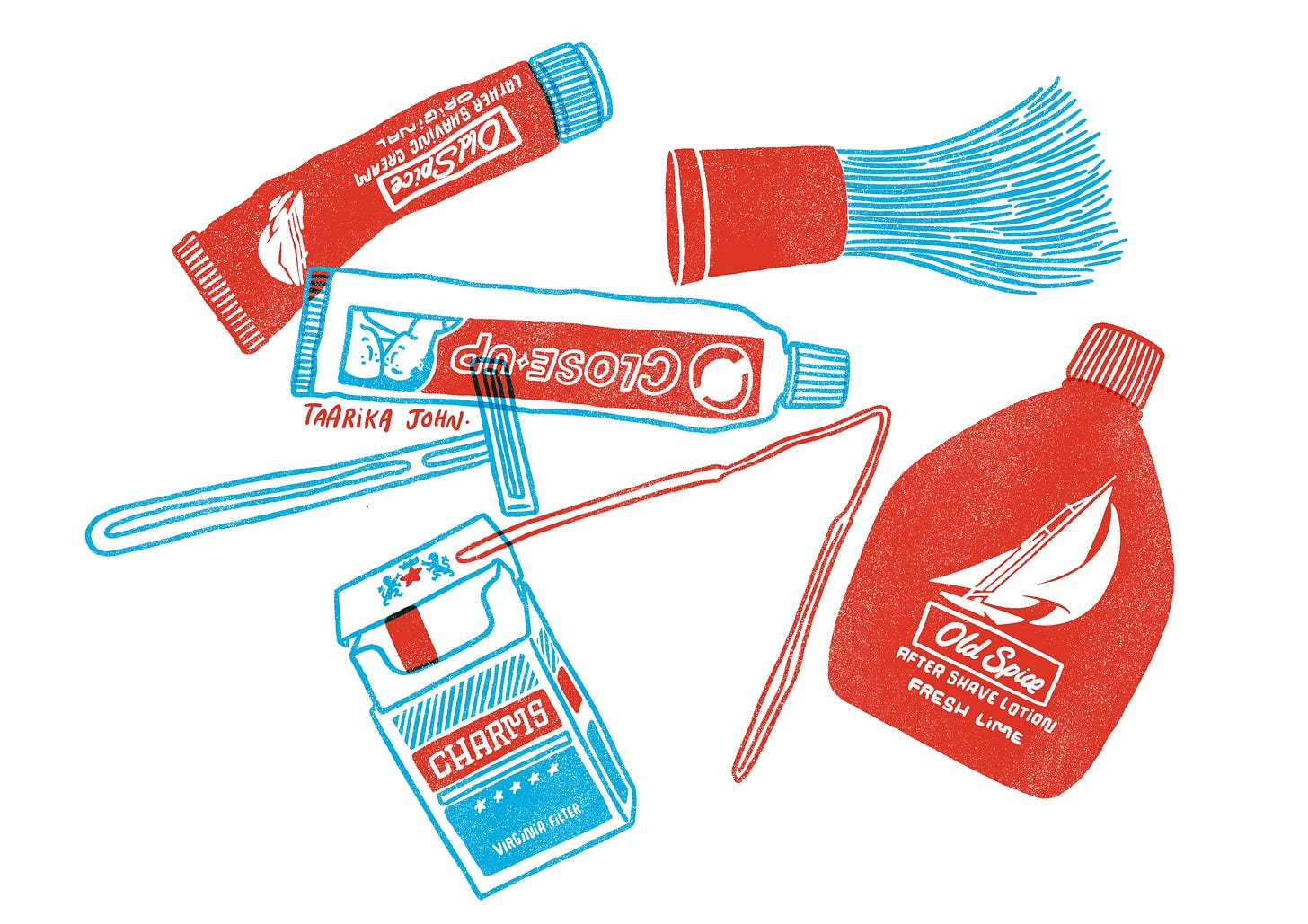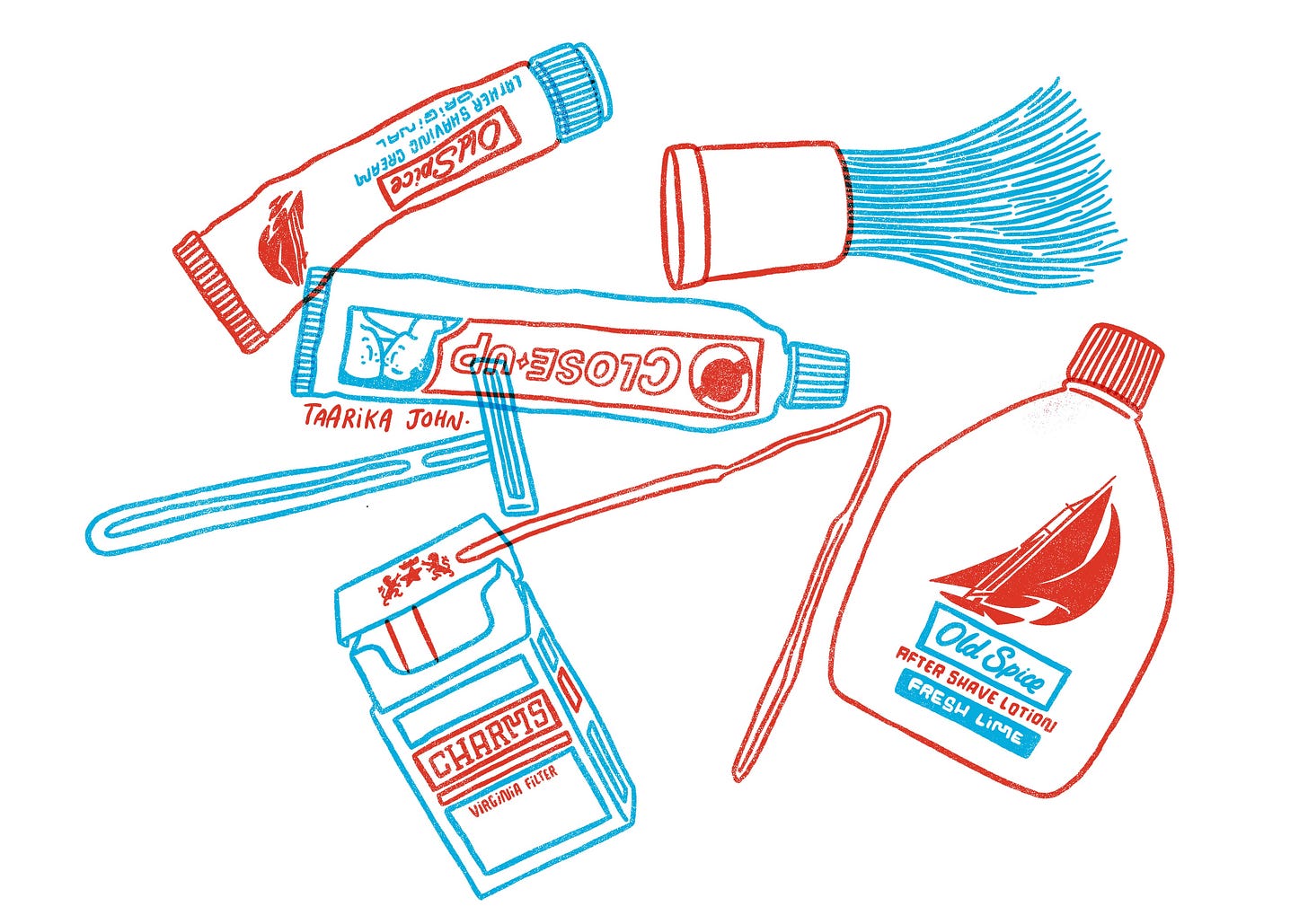Objects & Things.
Do every day objects hold meaning? What makes us choose the things that make us feel close to people?
It’s a sweltering hot mid-summer afternoon in Kochi. I’m back home from college for semester break and sprawled across the cool, tiled floor in front of the television when I hear my mother’s voice calling my name. Her head peers around the corner of the doorway, and she gestures for me to come help her downstairs.
It’s been a few months since my grandmother died, and my mother has been sorting through and clearing out her things. She is methodical in her approach, tackling one room at a time and organising items into neatly arranged and meticulously organised stacks. This afternoon, she tells me, we will be clearing out my grandparents’ old bedroom. No one has slept there since my grandfather died almost a decade ago, and the room has remained largely untouched since.
For years now, we’ve referred to it half-jokingly as The Shrine. After Appacha died, Ammachi set up a little display on a corner of the desk - a rare photograph of Appacha smiling, a cutout of his obituary, his glasses, and his watch. She refused to spend the night there, preferring instead to sleep upstairs in my brother’s room. She would nap there in the afternoons, and occasionally, I would find her just standing there, looking around the room in contemplative silence. It was her private place, and though it was largely unused, Ammachi had guarded the room possessively.
It is dark inside when we enter and noticeably cooler than the rest of the house. I draw the curtains, lacy crochet flowers shrouded in dust, coughing and sputtering as sunlight swiftly fills the room. My mother hands me a dusting cloth and motions for me to start with the desk. She has already opened the wardrobe, pulling heaps of saris off the shelves and stacking them on the bed.
Standing at the desk, dusting cloth in hand, I pause for a moment. It is my grandfather’s desk. He used to sit at this desk every evening, writing the day’s accounts in one of his large leather-bound ledgers. Appacha was a scrupulous man, and every rupee he ever spent was documented carefully in his neat but tiny handwriting. The desk looks almost identical to how he left it many years ago. But then again, so does pretty much everything else in here.
I begin to clear the desk, wiping the dust off each item and organizing them on the floor. My mother and I make idle chit-chat as we tackle our individual tasks. I have several loud sneezing fits and pretend not to hear her when my mother asks if I’ve taken my allergy medication. She tells me the stories behind some of Ammachi’s saris as she sorts through them.
Eventually, I manage to clear everything off the top of the desk. Once I finish the drawers, I know I can finally go back upstairs and return to my vegetative vacation time. I return to my task with newfound enthusiasm, yanking both drawers open. One drawer is filled with papers - receipts, random documents, and old cheque books piled together. The other drawer is sparse, containing a collection of few but strange items.
I pull out an ancient tube of Close Up toothpaste, squeezed practically empty, its white edges tinged with yellow. Next, I find a rusty pair of tweezers bent out of shape, followed by another half-empty tube of shaving cream. Old Spice aftershave. A razor.
It’s beginning to dawn on me that these are my grandfather’s things. The last of his things. The things he left behind when we took him to the hospital for the last time. “Yuck. Why would she keep this stuff?” I ask my mother, incredulous. I rifle further through the drawer’s contents, mildly appalled at the mundanity of the objects my grandmother had chosen to keep. I know she missed him, but why would she possibly want to hold on to his last toothbrush?!
Opening the yellowing box of Charms cigarettes, I’m not surprised to find a sad, limp cigarette inside. Suddenly, I can see Appacha’s hands lighting a match; I can hear the hiss of the flame as he brings it closer to his face, his cheeks puffing the cigarette to life. I sniff at the Old Spice bottle and remember lying down on this bed, talking a mile a minute while Appacha gets ready to go to the bank. Looking over at the windows, I can see his silhouette behind his white mundu, which he would hold up behind himself like a tent while he changed into trousers in complete discretion, a skill I was both mystified and amazed by. I run my thumb along the bristles of the shaving brush and feel the cool, hard marble countertop under my chin, watching my grandfather shave.
I followed him everywhere, told him my every thought, and rarely gave him a moment to himself. But I don’t remember a single instance where I felt like an intrusion, or he told me to go away. He embraced all my big feelings, little quirks, and imaginary friends without batting an eyelid. We would play make-believe games on the verandah. My stern disciplinarian Appacha, who terrified many people, would look up from his newspaper during his turns in our games and converse with my imaginary friends as if it were the most natural thing in the world. We were more than a grandparent and first (read: favourite) grandchild. We were each other’s best friends and closest confidants.
Looking at the odd pile of objects in the drawer, I am overwhelmed by memories. Each one is sharp, distinct, the clearest I’ve had of my grandfather in years. Lines from Henry Miller, read and forgotten many years ago, suddenly come to mind. Where is the chair you sit in, where is your favourite comb, your toothbrush, your nail file? Trot them out that I may devour them at one gulp. My reaction the first time I read it was similar to my initial reaction to the drawer.
But somewhere in this cold, dusty room, I had begun to understand why my grandmother had preserved the Shrine. Why she had chosen to hold onto his comb, his toothbrush, his nail file. These little things her husband had used every day for years, left behind one evening and never come back for.
I look over at my mother, unsure how to begin organising the drawer of everyday oddities. She takes the dusting cloth out of my hand and releases me, finally, from my cleaning duties. I sprint up the stairs and grab the remote, free to flip mindlessly through channels once again and complain about how there’s nothing good to watch on TV.




Beautifully written Taarika .. enjoyed reading it
Splendid read and beautiful illustrations!